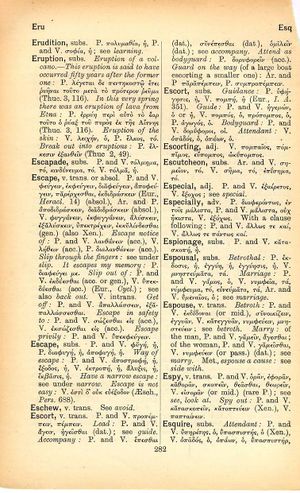escape: Difference between revisions
πολλὰ τὰ δεινὰ κοὐδὲν ἀνθρώπου δεινότερον πέλει → many things are formidable, and none more formidable than man | wonders are many, and none is more wonderful than man | many things are bad, but nothing is more atrocious than man
(2) |
m (Woodhouse1 replacement) |
||
| Line 1: | Line 1: | ||
{{Woodhouse1 | {{Woodhouse1 | ||
|Text=[[File:woodhouse_282.jpg|thumb|link={{filepath:woodhouse_282.jpg}}]] | |Text=[[File:woodhouse_282.jpg|thumb|link={{filepath:woodhouse_282.jpg}}]] | ||
P. and V. [[φεύγω | ===verb transitive or absolute=== | ||
[[prose|P.]] and [[verse|V.]] [[φεύγω]], [[φεύγειν]], [[ἐκφεύγειν]], [[διαφεύγειν]], [[ἀποφεύγειν]], [[παρέρχεσθαι]], [[ἐκδιδράσκειν]] ([[Euripides|Eur.]], ''[[Heraclidae]]'' 14) (absol.), [[Aristophanes|Ar.]] and [[prose|P.]] [[ἀποδιδράσκειν]], [[διαδιδράσκειν]] (absol.), [[verse|V.]] [[φυγγάνειν]], [[ἐκφυγγάνειν]], [[ἀλύσκειν]], [[ἐξαλύσκειν]], [[ὑπεκτρέχειν]], [[ἐκκυλίνδεσθαι]] (gen.) (also [[Xenophon|Xen.]]). | |||
[[escape notice of]]: [[prose|P.]] and [[verse|V.]] [[λανθάνειν]] (acc.), [[verse|V.]] [[λήθειν]] (acc.), [[prose|P.]] [[διαλανθάνειν]] (acc.). | |||
[[slip through the fingers]]: see under [[slip]]. | |||
P. and V. [[φυγή]], ἡ, P. [[διαφυγή]], ἡ, [[ἀποφυγή]]. ἡ. | [[it escapes my memory]]: [[prose|P.]] [[διαφεύγει]] με. | ||
[[slip out of]]: [[prose|P.]] and [[verse|V.]] [[ἐκδύεσθαι]] (acc. or gen.), [[verse|V.]] [[ὑπεκδύεσθαι]] (acc.) ([[Euripides|Eur.]], ''Cyclops''); see also [[back out]]. '''verb intransitive''' | |||
[[get off]]: [[prose|P.]] and [[verse|V.]] [[ἀπαλλάσσειν]], [[ἐξαπαλλάσσεσθαι]]. | |||
[[escape in safety to]]: [[prose|P.]] and [[verse|V.]] [[σώζεσθαι εἰς]] (acc.), [[verse|V.]] [[ἐκσώζεσθαι εἰς]] (acc.). | |||
[[escape privily]]: [[prose|P.]] and [[verse|V.]] [[ὑπεκφεύγειν]]. | |||
===substantive=== | |||
[[prose|P.]] and [[verse|V.]] [[φυγή]], ἡ, [[prose|P.]] [[διαφυγή]], ἡ, [[ἀποφυγή]]. ἡ. | |||
[[way of escape]]: [[prose|P.]] and [[verse|V.]] [[ἀποστροφή]], ἡ, [[ἔξοδος]], ἡ, [[verse|V.]] [[ἐκτροπή]], ἡ, [[ἄλυξις]], ἡ, [[ἔκβασις]], ἡ. | |||
[[have a narrow escape]]: see under [[narrow]]. | |||
[[escape is not easy]]: [[verse|V.]] [[ἐστὶ δ' οὐκ εὐέξοδον]] ([[Aeschylus|Aesch.]], ''[[Persae]]'' 688). | |||
}} | }} | ||
{{esel | {{esel | ||
|sltx=[[ἔκπτωσις]], [[ἀνάφυξις]], [[ἐκπλοκή]], [[ἔκροια]], [[ἀναφυγή]], [[ἔκδυσις]], [[ἀποστροφή]] | |sltx=[[ἔκπτωσις]], [[ἀνάφυξις]], [[ἐκπλοκή]], [[ἔκροια]], [[ἀναφυγή]], [[ἔκδυσις]], [[ἀποστροφή]] | ||
}} | }} | ||
Revision as of 08:50, 20 May 2020
English > Greek (Woodhouse)
verb transitive or absolute
P. and V. φεύγω, φεύγειν, ἐκφεύγειν, διαφεύγειν, ἀποφεύγειν, παρέρχεσθαι, ἐκδιδράσκειν (Eur., Heraclidae 14) (absol.), Ar. and P. ἀποδιδράσκειν, διαδιδράσκειν (absol.), V. φυγγάνειν, ἐκφυγγάνειν, ἀλύσκειν, ἐξαλύσκειν, ὑπεκτρέχειν, ἐκκυλίνδεσθαι (gen.) (also Xen.).
escape notice of: P. and V. λανθάνειν (acc.), V. λήθειν (acc.), P. διαλανθάνειν (acc.).
slip through the fingers: see under slip.
it escapes my memory: P. διαφεύγει με.
slip out of: P. and V. ἐκδύεσθαι (acc. or gen.), V. ὑπεκδύεσθαι (acc.) (Eur., Cyclops); see also back out. verb intransitive
get off: P. and V. ἀπαλλάσσειν, ἐξαπαλλάσσεσθαι.
escape in safety to: P. and V. σώζεσθαι εἰς (acc.), V. ἐκσώζεσθαι εἰς (acc.).
escape privily: P. and V. ὑπεκφεύγειν.
substantive
P. and V. φυγή, ἡ, P. διαφυγή, ἡ, ἀποφυγή. ἡ.
way of escape: P. and V. ἀποστροφή, ἡ, ἔξοδος, ἡ, V. ἐκτροπή, ἡ, ἄλυξις, ἡ, ἔκβασις, ἡ.
have a narrow escape: see under narrow.
escape is not easy: V. ἐστὶ δ' οὐκ εὐέξοδον (Aesch., Persae 688).
Spanish > Greek
ἔκπτωσις, ἀνάφυξις, ἐκπλοκή, ἔκροια, ἀναφυγή, ἔκδυσις, ἀποστροφή

